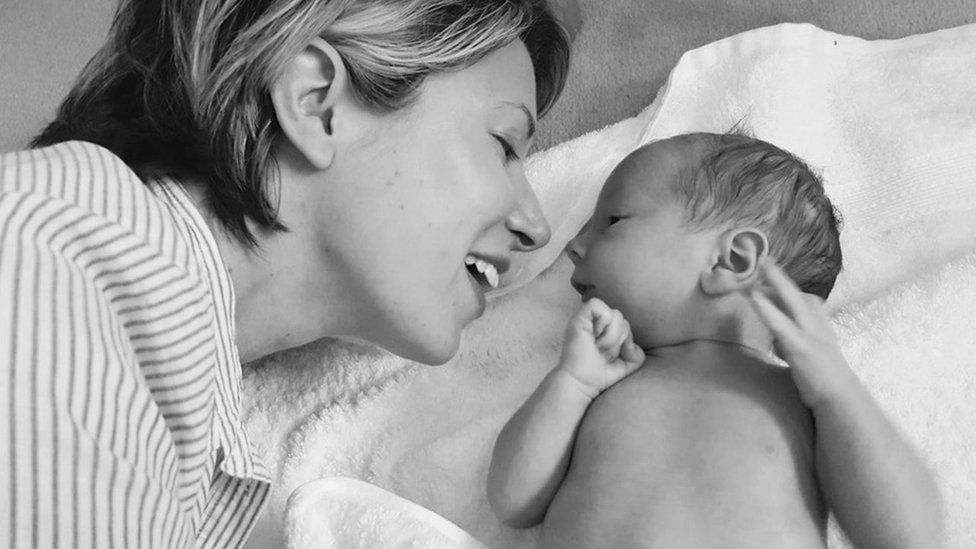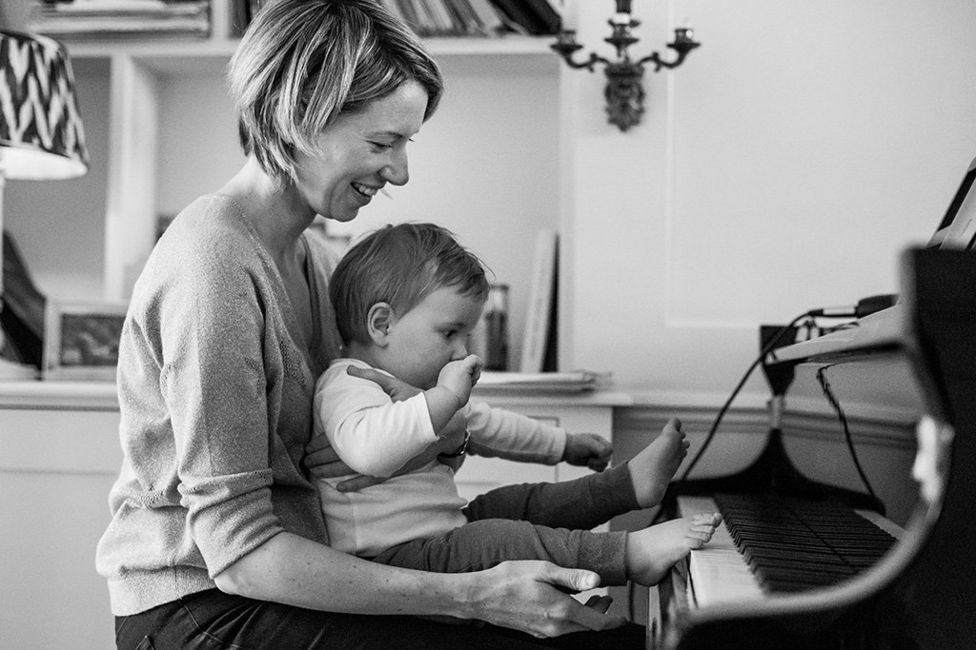
How my pregnancy led to a life-changing diagnosis
It's four in the morning and something's wrong. There's an empty space where my husband should be. A flicker on the baby monitor and there he is - holding Sam, our four-month-old baby. I'm confused - I always hear Sam first. Over the next few weeks, this happens again and again - I keep sleeping through Sam's cries at night. Then during the day, I notice I'm struggling to hear other things, too. I find myself staring at my friends' lips to work out what they're saying.
After a referral from my GP, I go to an audiology clinic and following a series of tests, I'm told I've lost a lot of my hearing in my right ear. "Don't worry, it's probably just congestion - the after-effects of a cold. If things aren't better in six weeks, come back," I'm told.
Six weeks later, on a hot August day, I return to the clinic. I'm called into Room 5 - an airless, white room with bare walls. A consultant in a light blue shirt says that from my symptoms, he thinks I have something called otosclerosis. 'It's a degenerative hearing condition,' he says. Genetic. And there's no cure.
That night, I lie in bed and consider the questions I didn't ask - how soon will I lose my hearing? Could I go deaf? If it's genetic, have I passed it on to my kids? I think back to when I was a child and my obsession with sound began. I recall the tapes I still have in a drawer - my granddad talking, my cat purring, an accordion festival, endless recordings of the sea. I remember learning the piano when I was little, the moment I could name the pitch of a note by hearing it and the world became an orchestra. I think of these sounds slipping away and I'm terrified.
Otosclerosis is relatively common - around one to two percent of us have it. But it affects one group more than others - women who have recently had a baby. That's because of the effect of pregnancy hormones that fast-track the disease, and it explains why I noticed my hearing loss just after giving birth.
 Helena noticed the hearing loss after the birth of her second child
Helena noticed the hearing loss after the birth of her second child
For the next few months, I ignore my diagnosis. I don't want to make it real by saying it out loud. And I can't bring myself to tell people at work, when my job as a broadcaster and documentary maker depends on my ability to hear.
I read a lot about otosclerosis and discover why I'm struggling to hear. Imagine you're standing on a beach, watching the sea. The noises you can hear ripple through the air towards you - small ripples for high pitched noises like gulls, or large ripples for the deep rumbles of the sea. When those sound waves hit your eardrum, it vibrates and that vibration is sent behind your eardrum to three tiny bones - the malleus, the incus and the stapes, the smallest bone in your body. Those bones then send the vibration into your cochlea - a labyrinth of bones that sits deep in your ear. And this is the magical moment - when your cochlea turns the mechanical waves into electrical waves that your brain can process - and you hear.
If you have otosclerosis, when the vibrations reach your stapes, it doesn't vibrate. That's because otosclerosis is a disease that affects the bone that surrounds the stapes.
Although there's no cure, I discover there's an operation that could restore my hearing. But there are risks - in rare cases the operation could leave your face paralysed, you could become permanently dizzy, or you could go deaf in your operated ear.
I wrestle with the decision - I'm in the middle of making a podcast series, Tunnel 29, about an escape under the Berlin Wall. The thought of losing my hearing in one ear feels too much of a risk and I decide against the operation.
The next few months are hard. I try an NHS hearing aid but I find it hard to differentiate between background sounds and speech. Then, after another test shows I've lost even more hearing in my right ear, I decide to go ahead.
It's a cold March morning, and I'm lying in an operating theatre at the Royal Ear Nose and Throat Hospital. Jeremy Lavy - the ear surgeon doing my operation - has somehow got to get to my stapes, deep inside my head. He folds my eardrum forward, picks up a tiny laser, points it at my stapes, and this is the crucial moment. If his hand moves a millimetre, my face could be paralysed, or I could lose all the hearing in my ear.
He fires the laser. My stapes comes loose, then he takes a tiny prosthetic stapes, pushes it through my ear canal and hooks it on to the bone. Suddenly, I can hear out of my right ear - music, the gentle sound of talking, the metallic clink of surgical instruments on trays. It feels like a mini-miracle.
Then two hours later, when I'm resting in a ward, a noise suddenly appears in my right ear - it sounds like a kettle whistling and it's incredibly loud. A nurse reminds me that you can have strange noises after the operation, but that night, the noise continues - this strange new sound that's nothing like the more-typical high-pitched tinnitus I've had for years.
At my two-week check-up, Jeremy Lavy explains that in 90% of cases, the operation reduces or takes away tinnitus. But for 10% of people, their tinnitus doesn't improve - or it might get worse. They don't know why.
 Helena's hearing was restored but she lives with a constant loud whistling sound
Helena's hearing was restored but she lives with a constant loud whistling sound
The loud kettle-whistling continues and it's hard to think about anything else. I crave noise. The London underground becomes my favourite place as the roar of the tube drowns out the whistling. One evening I'm at home with the kids. We're looking at a picture book and my daughter Matilda is helping Sam with his first words. As he babbles "cat" and "duck", I wish I could hear him without the whistling. That night I find a tinnitus forum online. I post a message, and people reply with advice - stop drinking alcohol, get more sleep, do more exercise, don't go anywhere noisy. Over the next few weeks, I do everything they suggest - which means I rarely go out. It helps - some nights the whistling feels quieter, but I feel isolated.
This might sound familiar. Around one in eight of us live with constant tinnitus. It could be ringing, whooshing, buzzing, or humming and then there's pulsatile tinnitus, which beats in time with your pulse. In tinnitus forums, there's one piece of advice everyone gives: Don't think about the tinnitus. I try. But it's like when someone says, "Don't think about a monkey" - and there it is, you're thinking about a monkey.
As I try to find a way of living with this new noise, I begin to tell more people about my diagnosis. And after I've told them about the broken bit of my body, invariably they tell me about the broken bit of them.
The conversations are extraordinary. I hear about decades-long searches for diagnosis, conditions I never knew existed, treatments I never thought possible. But the bit I'm most interested in is the recovery - after diagnosis and treatment, how do you put yourself back together? I start thinking about how little we share of these moments. Yes, we might tell friends in the pub about an illness or operation, but we often skate over things. It's hard to convey the visceral details - the sound of a auditory hallucination, the prickling fear when you're sat in a room about to be given a diagnosis, the dizzying relief when you find a way of coping with something you thought you couldn't live with.
And that's where the idea for my new podcast series - Room 5 - comes from.
So I start recording interviews: Bex (a university student) tells me about her anxiety and hallucinations that led to a revelatory diagnosis; Jon - a businessman - tells me about the itching in his penis that began at Peppa Pig World; Serena tells me about a unfathomable decision she had to make after a diagnosis, Gavandra tells me how she came to terms with a childhood trauma, and Joel tells me about his rare condition that's advanced our understanding of empathy.
It's been two years since my ear operation. There were times I regretted it, when I thought I'd never learn to live with the loud kettle-whistling noise. But like many people who live with constant tinnitus, I've found ways of coping. Now, I have no regrets. Instead, I feel lucky to live in a time when a brilliant surgeon can give me back my hearing.
The operation may not have given me an uncomplicated fix, but often that's how it goes. You go into a room, you're diagnosed with a condition, you're given treatment and nearly always, there's something unexpected, and you're forever changed. There are professionals who support you through recovery - doctors, physiotherapists, occupational therapists - but eventually, you're left with yourself and you have to find the answers that don't exist in medical textbooks.
Many of us, one day, will sit in a room and be given a diagnosis. For me, it was Room 5. For you, it will likely have been a room with a different number. Or maybe it hasn't happened yet. But if - when - it does, I hope the stories in Room 5 help shepherd you through whatever comes.










